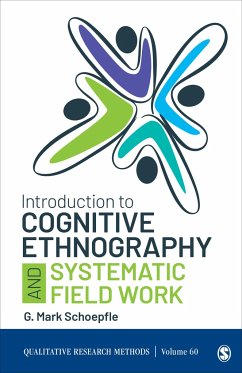G. Mark Schoepfle
Introduction to Cognitive Ethnography and Systematic Field Work
G. Mark Schoepfle
Introduction to Cognitive Ethnography and Systematic Field Work
- Broschiertes Buch
- Merkliste
- Auf die Merkliste
- Bewerten Bewerten
- Teilen
- Produkt teilen
- Produkterinnerung
- Produkterinnerung
Introduction to Cognitive Ethnography and Systematic Field Work by G. Mark Schoepfle guides readers on the fundamentals of cognitive ethnography. The focus of this qualitative technique is collecting data from interviews. This brief text covers using this method from starting a research project to writing a report.
Andere Kunden interessierten sich auch für
![Meta-Ethnography Meta-Ethnography]() George W. NoblitMeta-Ethnography47,99 €
George W. NoblitMeta-Ethnography47,99 €![A Narrative Approach to Organization Studies A Narrative Approach to Organization Studies]() Barbara CzarniawskaA Narrative Approach to Organization Studies47,99 €
Barbara CzarniawskaA Narrative Approach to Organization Studies47,99 €![How to Write a Phenomenological Dissertation How to Write a Phenomenological Dissertation]() Katarzyna Peoples (USA Walden University)How to Write a Phenomenological Dissertation48,99 €
Katarzyna Peoples (USA Walden University)How to Write a Phenomenological Dissertation48,99 €![An Introduction to Systematic Reviews An Introduction to Systematic Reviews]() An Introduction to Systematic Reviews38,99 €
An Introduction to Systematic Reviews38,99 €![Conducting Interpretive Policy Analysis Conducting Interpretive Policy Analysis]() Dvora YanowConducting Interpretive Policy Analysis47,99 €
Dvora YanowConducting Interpretive Policy Analysis47,99 €![The Mindful Qualitative Researcher The Mindful Qualitative Researcher]() Laura L. LemonThe Mindful Qualitative Researcher45,99 €
Laura L. LemonThe Mindful Qualitative Researcher45,99 €![The Life Story Interview The Life Story Interview]() Robert G. AtkinsonThe Life Story Interview47,99 €
Robert G. AtkinsonThe Life Story Interview47,99 €-
-
-
Introduction to Cognitive Ethnography and Systematic Field Work by G. Mark Schoepfle guides readers on the fundamentals of cognitive ethnography. The focus of this qualitative technique is collecting data from interviews. This brief text covers using this method from starting a research project to writing a report.
Hinweis: Dieser Artikel kann nur an eine deutsche Lieferadresse ausgeliefert werden.
Hinweis: Dieser Artikel kann nur an eine deutsche Lieferadresse ausgeliefert werden.
Produktdetails
- Produktdetails
- Qualitative Research Methods
- Verlag: SAGE Publications Inc
- Seitenzahl: 184
- Erscheinungstermin: 22. Dezember 2021
- Englisch
- Abmessung: 141mm x 215mm x 16mm
- Gewicht: 241g
- ISBN-13: 9781544351018
- ISBN-10: 1544351011
- Artikelnr.: 62552123
- Herstellerkennzeichnung
- Libri GmbH
- Europaallee 1
- 36244 Bad Hersfeld
- gpsr@libri.de
- Qualitative Research Methods
- Verlag: SAGE Publications Inc
- Seitenzahl: 184
- Erscheinungstermin: 22. Dezember 2021
- Englisch
- Abmessung: 141mm x 215mm x 16mm
- Gewicht: 241g
- ISBN-13: 9781544351018
- ISBN-10: 1544351011
- Artikelnr.: 62552123
- Herstellerkennzeichnung
- Libri GmbH
- Europaallee 1
- 36244 Bad Hersfeld
- gpsr@libri.de
G. Mark Schoepfle has devoted his entire career to applied anthropology in federal and tribal government, with an adjunct status in various academic institutions that have often helped support this research. He received a bachelor's degree in anthropology from the University of California, Berkeley, in 1968. Following his military service, he received his Master's in 1972 and Doctorate in social anthropology 1977 from Northwestern University, under the anthropological linguist Oswald Werner, his dissertation chair. His employment in anthropology began with the Navajo Tribal Division of Education. Here, under the supervision of Oswald Werner, he helped train and supervise Navajo researchers, and compile ethnographic reports of the Navajo Nation's different school systems. What began originally as involvement with a one-year training and research project evolved into a 14-year research and teaching career on the Navajo Nation. It involved both research and training Navajos as active research participants and analysts, co-publishers, and findings presenters. Beginning in 1974, he was involved with Oswald Werner in developing a researcher's training manual that finally became the two-volume Systematic Fieldwork published in 1987. From 1980 to 1984 he also served as Deputy Director of the Northwestern University Summer Field School in Ethnography. In 1988 he shifted his career interests to auditing and evaluation at the Government Accountability Office, and later the Department of the Interior in Washington, DC. At the Department of the Interior, he has served as cultural anthropologist for the National Park Service's program in applied ethnography, and at what is now the Office of Federal Acknowledgment.
Preface CHAPTER 1
Orientation to Ethnography and Cognitive Ethnography Ethnography Material Culture and Cultural Durability Kinds of Ethnography Abductive Reasoning in Cognitive Ethnography How Ethnography Differs From Journalism Everyone Is Biased and Must Cope With the Fact Preparation for an Ethnographer's Career: Ethnographer as Expert Witness CHAPTER 2
Planning and Proposing a Research Project The Proposal The Parties Involved: Peer Review and Institutional Review Boards CHAPTER 3
The Semantic Unity of the Ethnographic Interview The Lexical-Semantic Field Theory and the MTQ Schema Specialized MTQ Interview Techniques CHAPTER 4
The Natural History of the Ethnographic Interview The Natural History of the Interview Grand-Tour and Mini-Tour Questions About People Through Personal Networks: The Crystalized Structure of a "Snowball Sample" CHAPTER 5
Ethnographic Analysis With Complex Logical-Semantic Relationships Enhancing MTQ Analyses Analysis of Complex Semantic Relationships Ethnographic Decision Models: Entering Choice Into VAPs Applying Decision Models in Cognitive Ethnography CHAPTER 6
Language Transcription and Translation Interview Transcription Interview Translation CHAPTER 7
Observation Proposed Justifications for Sole Reliance on Observation Kinds of Observation The Application of Photography to Interview and Observation Observation and Evidence CHAPTER 8
Writing the Ethnographic Report Four Major Report-Writing Styles: Descriptive, Analytical, Synthetic, and Case Study When Schema Are Not Available or Have Not Been Generated Organizing the Report A Final Word on Native Coresearchers References
Orientation to Ethnography and Cognitive Ethnography Ethnography Material Culture and Cultural Durability Kinds of Ethnography Abductive Reasoning in Cognitive Ethnography How Ethnography Differs From Journalism Everyone Is Biased and Must Cope With the Fact Preparation for an Ethnographer's Career: Ethnographer as Expert Witness CHAPTER 2
Planning and Proposing a Research Project The Proposal The Parties Involved: Peer Review and Institutional Review Boards CHAPTER 3
The Semantic Unity of the Ethnographic Interview The Lexical-Semantic Field Theory and the MTQ Schema Specialized MTQ Interview Techniques CHAPTER 4
The Natural History of the Ethnographic Interview The Natural History of the Interview Grand-Tour and Mini-Tour Questions About People Through Personal Networks: The Crystalized Structure of a "Snowball Sample" CHAPTER 5
Ethnographic Analysis With Complex Logical-Semantic Relationships Enhancing MTQ Analyses Analysis of Complex Semantic Relationships Ethnographic Decision Models: Entering Choice Into VAPs Applying Decision Models in Cognitive Ethnography CHAPTER 6
Language Transcription and Translation Interview Transcription Interview Translation CHAPTER 7
Observation Proposed Justifications for Sole Reliance on Observation Kinds of Observation The Application of Photography to Interview and Observation Observation and Evidence CHAPTER 8
Writing the Ethnographic Report Four Major Report-Writing Styles: Descriptive, Analytical, Synthetic, and Case Study When Schema Are Not Available or Have Not Been Generated Organizing the Report A Final Word on Native Coresearchers References
Preface CHAPTER 1
Orientation to Ethnography and Cognitive Ethnography Ethnography Material Culture and Cultural Durability Kinds of Ethnography Abductive Reasoning in Cognitive Ethnography How Ethnography Differs From Journalism Everyone Is Biased and Must Cope With the Fact Preparation for an Ethnographer's Career: Ethnographer as Expert Witness CHAPTER 2
Planning and Proposing a Research Project The Proposal The Parties Involved: Peer Review and Institutional Review Boards CHAPTER 3
The Semantic Unity of the Ethnographic Interview The Lexical-Semantic Field Theory and the MTQ Schema Specialized MTQ Interview Techniques CHAPTER 4
The Natural History of the Ethnographic Interview The Natural History of the Interview Grand-Tour and Mini-Tour Questions About People Through Personal Networks: The Crystalized Structure of a "Snowball Sample" CHAPTER 5
Ethnographic Analysis With Complex Logical-Semantic Relationships Enhancing MTQ Analyses Analysis of Complex Semantic Relationships Ethnographic Decision Models: Entering Choice Into VAPs Applying Decision Models in Cognitive Ethnography CHAPTER 6
Language Transcription and Translation Interview Transcription Interview Translation CHAPTER 7
Observation Proposed Justifications for Sole Reliance on Observation Kinds of Observation The Application of Photography to Interview and Observation Observation and Evidence CHAPTER 8
Writing the Ethnographic Report Four Major Report-Writing Styles: Descriptive, Analytical, Synthetic, and Case Study When Schema Are Not Available or Have Not Been Generated Organizing the Report A Final Word on Native Coresearchers References
Orientation to Ethnography and Cognitive Ethnography Ethnography Material Culture and Cultural Durability Kinds of Ethnography Abductive Reasoning in Cognitive Ethnography How Ethnography Differs From Journalism Everyone Is Biased and Must Cope With the Fact Preparation for an Ethnographer's Career: Ethnographer as Expert Witness CHAPTER 2
Planning and Proposing a Research Project The Proposal The Parties Involved: Peer Review and Institutional Review Boards CHAPTER 3
The Semantic Unity of the Ethnographic Interview The Lexical-Semantic Field Theory and the MTQ Schema Specialized MTQ Interview Techniques CHAPTER 4
The Natural History of the Ethnographic Interview The Natural History of the Interview Grand-Tour and Mini-Tour Questions About People Through Personal Networks: The Crystalized Structure of a "Snowball Sample" CHAPTER 5
Ethnographic Analysis With Complex Logical-Semantic Relationships Enhancing MTQ Analyses Analysis of Complex Semantic Relationships Ethnographic Decision Models: Entering Choice Into VAPs Applying Decision Models in Cognitive Ethnography CHAPTER 6
Language Transcription and Translation Interview Transcription Interview Translation CHAPTER 7
Observation Proposed Justifications for Sole Reliance on Observation Kinds of Observation The Application of Photography to Interview and Observation Observation and Evidence CHAPTER 8
Writing the Ethnographic Report Four Major Report-Writing Styles: Descriptive, Analytical, Synthetic, and Case Study When Schema Are Not Available or Have Not Been Generated Organizing the Report A Final Word on Native Coresearchers References








